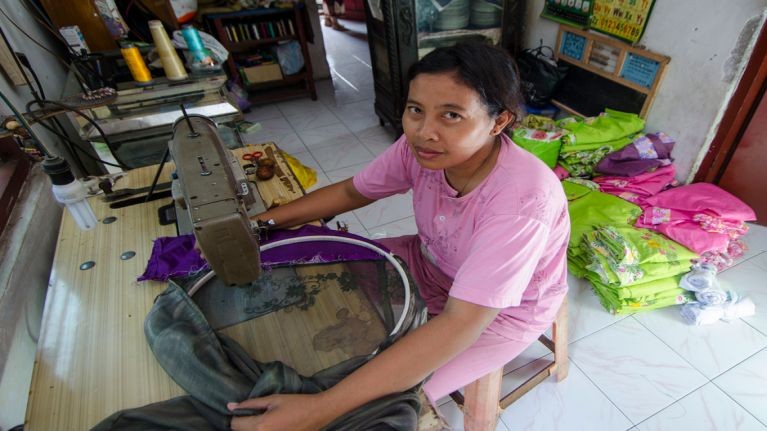Popular Reads
Top Results
Can't find what you're looking for?
View all search resultsPopular Reads
Top Results
Can't find what you're looking for?
View all search resultsHomeworkers denied basic workers' rights: SMERU study
A recent study on homeworkers found that the majority are women who work the equivalent of full-time jobs, but they make less than minimum wage and have neither safety equipment nor work-related insurance.
Change text size
Gift Premium Articles
to Anyone
A
recent study by the SMERU Research Institute, in cooperation with the Australia-Indonesia Partnership for Gender Equality And Women’s Empowerment (MAMPU), reveals that women who work from home in the informal sector are struggling to access the basic rights of workers.
The longitudinal study involved 1,742 households, 6,138 individuals and 3,180 women in five regencies in five provinces from 2014 to 2020, and found that homeworkers were usually not considered employees. They were thus omitted from basic workers’ rights, including minimum wage and employee health insurance schemes.
It also discovered that the majority of homeworkers, or 73.5 percent, were women.
"Our study found that homeworkers work 30 to 40 hours per week on average, sometimes even more. However, they receive very low wages, less than Rp 500,000 [US$33] a month," SMERU researcher Veto Tyas Indrio said on Monday.
In addition to the long hours and low wages, SMERU found that homeworkers generally had poor working conditions. Most of them did not have any safety equipment, nor did they have have work-related insurance.
Most of the homeworkers surveyed said that work safety was their primary concern, especially since they typically worked in labor-intensive industries such as furniture and textile manufacturing, including textile weaving. They also said that they often had to source safety gear like masks and gloves on their own.
"Most of them feel that being supplied with [protective gear] is a luxury for homeworkers," said Veto, stressing that homeworkers were generally more vulnerable than other types of informal workers.
"In general, they work without any written contracts. Some of them are subcontracted through middle men," he said.
Dharendra Wardhana, who heads the legal analysis division at the National Development Planning Board (Bappenas), said that the poor working conditions of homeworkers was a timely and highly relevant issue in light of the COVID-19 health emergency.
"A Bappenas study projects that most new jobs in the future will be created in the informal sector, including homeworking. However, it would be difficult to [regulate] these issues in national regulations, as the deliberation of the new omnibus law on job creation has stalled amid the pandemic," he said.
Dharendra said that for now, the most realistic course to take in improving the working conditions of homeworkers was to provide awareness and training programs on topics such as labor rights and workplace health and safety.
He also urged scholars and researchers to dig deeper into the issue to provide more evidence-based insights.
"More research is crucial to bring this issue to a wider audience," he said.










